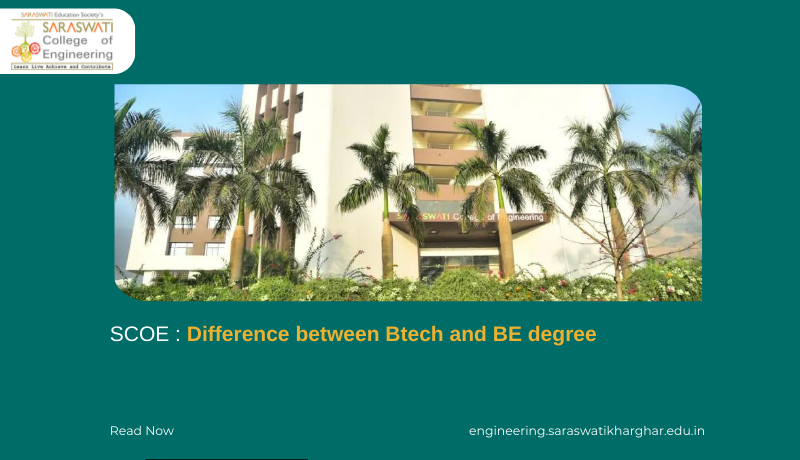Difference between btech and be degree

When choosing an engineering degree, students often find themselves at a crossroads, wondering which path to take: a Bachelor of Engineering (BE) or a Bachelor of Technology (B.Tech). Understanding the difference between B.Tech and BE degrees is crucial in making an informed decision that aligns with your career goals. Both degrees are offered at Saraswati College of Engineering (SCOE), providing students with options that cater to their academic and professional aspirations. This article delves into the nuances of both degrees, helping you choose the right path for your future.
What is the difference between btech and be degree?
Both BE and B.Tech degrees are valuable and cater to different career aspirations. BE focuses more on theoretical knowledge and research, making it suitable for students interested in academia or higher studies. B.Tech emphasizes practical skills and industry readiness, ideal for those aiming to enter the workforce immediately after graduation.
Choosing the right degree depends on your career goals, interests, and the type of learning experience you prefer. Both degrees can lead to successful careers in engineering, with ample opportunities in various fields
| Aspect | Bachelor of Engineering (BE) | Bachelor of Technology (B.Tech) |
| Curriculum Focus | Emphasizes theoretical knowledge and engineering principles. | Focuses on practical applications and technological advancements. |
| Course Orientation | More knowledge-oriented with a theoretical base. | More skill-oriented with an emphasis on practical skills. |
| Course Structure | It is structured with a fixed syllabus, focusing on comprehensive engineering concepts. | Flexible with electives, allowing for customization based on industry trends. |
| Specializations | Traditional disciplines like Civil, Mechanical, and Electrical Engineering. | Modern fields like AI, Data Science, and Cybersecurity. |
| Teaching Methodology | Traditional lectures, theoretical classes, and exams. | Hands-on learning with workshops, labs, and internships. |
| Research vs. Industry | Research-oriented, ideal for higher studies and academic careers. | Industry-oriented, preparing students for immediate employment. |
| Duration | Typically 4 years with 8 semesters. | Typically 4 years with 8 semesters. |
| Academic Rigour | High theoretical rigor with complex engineering concepts. | Intense practical focus, demanding hands-on project work. |
| Eligibility | 10+2 with PCM/PCMB and entrance exams like JEE Main. | 10+2 with PCM and entrance exams like JEE Main. |
| Placements | Opportunities in R&D, academia, and higher education. | Preferred by tech companies, startups, and industry roles. |
| Institutions Offering | Offered by universities that provide diverse courses. | Typically offered by institutes focusing on engineering and technology. |
Curriculum Focus
The first major difference between B.Tech and BE degrees lies in their curriculum focus. BE, or Bachelor of Engineering, typically emphasizes theoretical knowledge and concepts. The curriculum is designed to provide students with a strong foundation in engineering principles and scientific theories.
On the other hand, B.Tech, or Bachelor of Technology, focuses more on practical applications and technological advancements. The curriculum is more industry-oriented, preparing students for the practical challenges they will face in the workplace. This practical approach is key to the difference between B.Tech and BE degrees.
Course Structure
The course structure also varies significantly between BE and B.Tech programs. BE courses are often more structured and rigid, with a fixed syllabus that covers essential engineering concepts. This structure ensures that students gain a comprehensive understanding of the theoretical aspects of engineering.
Conversely, B.Tech courses offer more flexibility, allowing students to choose electives and tailor their studies to their interests. This flexibility helps students focus on areas that align with current industry trends and demands, another important point in the B.Tech and BE difference.
Specializations
When it comes to specializations, both BE and B.Tech degrees offer a wide range of options. However, the approach to these specializations can differ. BE programs often provide specializations that are deeply rooted in traditional engineering disciplines such as Civil, Mechanical, and Electrical Engineering.
B.Tech programs, on the other hand, may offer more modern and emerging specializations like Artificial Intelligence, Data Science, and Cybersecurity. This difference between BE and B.Tech in India highlights the adaptability of B.Tech programs to evolving technological landscapes.
Teaching Methodology
The teaching methodology is another area where BE and B.Tech programs differ. BE programs tend to follow a more traditional teaching approach, with a focus on lectures, theoretical classes, and exams. The aim is to build a strong theoretical base for students.
B.Tech programs, however, emphasize hands-on learning and practical experience. Workshops, lab sessions, internships, and industry projects are integral parts of the curriculum. This practical approach is designed to equip students with real-world skills, underlining the be vs btech difference.
Research vs. Industry-Oriented
Another significant difference between B.Tech and BE degrees is their orientation towards research and industry. BE programs often lean towards research, encouraging students to engage in academic research projects and pursue higher studies.
In contrast, B.Tech programs are more industry-oriented, preparing students for immediate employment after graduation. The curriculum is designed to meet industry requirements, making graduates job-ready. This distinction is crucial when considering be vs btech placements.
Duration and Academic Rigour
Both BE and B.Tech degrees typically span four years. However, the academic rigour can differ. BE programs, with their focus on theory, can be more academically challenging, requiring students to grasp complex engineering concepts and theories.
B.Tech programs, with their practical focus, may demand more hands-on work and project-based learning. This practical emphasis can be intense but is geared towards equipping students with the skills needed for the workforce. Understanding this aspect is key to grasping the difference between B.Tech and BE degrees.
Eligibility and Entrance Exams
The eligibility criteria and entrance exams for BE and B.Tech degrees are generally similar. Both require students to have completed their higher secondary education with a strong foundation in science and mathematics. In India, entrance exams like JEE Main and state-level exams are common gateways for admission to both BE and B.Tech programs.
However, some institutions might have specific preferences. For instance, certain universities might prefer BE candidates for research-focused roles, while others might favour B.Tech candidates for industry-specific positions. This nuance is part of the broader B.Tech and BE difference.
BE vs B.Tech: What Is The Right Choice?
Choosing between a BE and a B.Tech degree ultimately depends on your career aspirations and interests. If you are inclined towards theoretical knowledge and research, a BE degree might be the right choice for you. BE programs are well-suited for students who plan to pursue higher studies or careers in academia and research.
On the other hand, if you are interested in practical applications and want to jump straight into the industry, a B.Tech degree could be more beneficial. B.Tech programs are designed to make you job-ready, with a curriculum that aligns with industry needs and trends.
Difference Between BE and B.Tech Placements
When it comes to placements, both BE and B.Tech graduates have ample opportunities. However, the nature of these opportunities can differ. BE graduates might find more opportunities in research and development roles, academic positions, and higher education institutions.
B.Tech graduates, with their industry-oriented training, are often preferred by technology companies, startups, and industries looking for skilled professionals who can hit the ground running. This distinction in placements is a critical aspect of the difference between BE and B.Tech degrees.
AICTE Approved, NAAC Accredited With Grade-“A+”
Saraswati College of Engineering (SCOE) is a prime example of an institution that offers both BE and B.Tech programs. SCOE is AICTE Approved and NAAC Accredited With Grade-“A+”, ensuring high-quality education and robust academic standards. The college’s commitment to excellence is reflected in its curriculum, faculty, and placement records.
Conclusion
Understanding the difference between B.Tech and BE degrees is essential for making an informed decision about your future. Both degrees have their unique strengths and cater to different career paths. Whether you choose a BE for its theoretical depth and research opportunities or a B.Tech for its practical approach and industry readiness, both can lead to rewarding careers in engineering. At Saraswati College of Engineering (SCOE), you can explore both options to find the best fit for you.
By considering the curriculum focus, course structure, specializations, teaching methodology, orientation, academic rigor, and placement opportunities at SCOE, you can make a well-informed choice that aligns with your career goals. Remember, the right choice between BE and B.Tech depends on your interests, strengths, and career aspirations.

